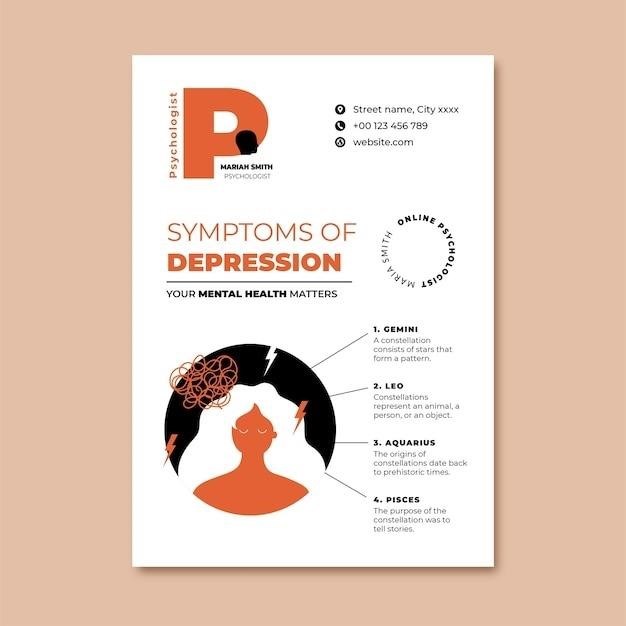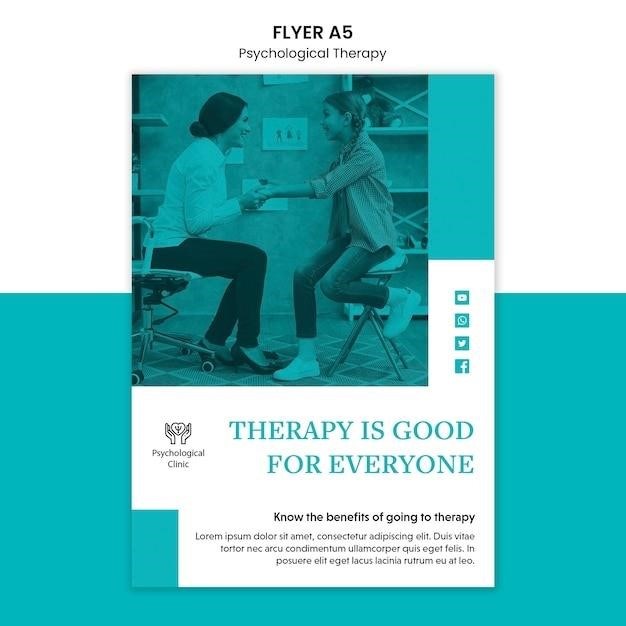mental health case study examples pdf
Mental Health Case Study Examples⁚ A Comprehensive Overview
Mental health case study examples in PDF format provide detailed accounts of individuals’ experiences with mental health conditions and the interventions they received.
Introduction
Mental health case studies are powerful tools for understanding and learning about the complexities of mental health conditions, treatment approaches, and individual experiences. These studies provide in-depth narratives that delve into the lived experiences of individuals facing various mental health challenges. They offer valuable insights into the psychological, social, and biological factors that contribute to mental well-being and distress; They serve as a bridge between theory and practice, enabling mental health professionals, researchers, and students to gain a deeper understanding of the human experience of mental illness.
Case studies are particularly relevant in the field of mental health because they allow for a nuanced exploration of individual cases, considering the unique circumstances and factors that influence each person’s journey. They provide a platform for examining the effectiveness of different therapeutic interventions and exploring the interplay between mental health, social determinants of health, and personal resilience. By analyzing case studies, we can gain a more comprehensive understanding of the challenges and triumphs associated with mental health, fostering empathy, and informing the development of more effective and compassionate mental health services.
Types of Mental Health Case Studies
Mental health case studies can be categorized based on their purpose, methodology, and the specific focus of the study. Some common types include⁚
- Descriptive Case Studies⁚ These studies provide detailed accounts of an individual’s experience with a mental health condition, including their symptoms, treatment history, and overall functioning. They often focus on describing the unique characteristics of a particular case and exploring potential factors that contribute to the individual’s challenges.
- Treatment Outcome Case Studies⁚ These studies examine the effectiveness of a specific therapeutic intervention for a particular individual. They track the individual’s progress over time, analyzing changes in symptoms, functioning, and overall well-being. Treatment outcome case studies can be helpful in understanding the efficacy of different therapies and identifying potential predictors of successful treatment.
- Process Case Studies⁚ This type of case study focuses on the therapeutic process itself, exploring the interactions between the therapist and client, the therapeutic techniques used, and the client’s responses to treatment. Process case studies can provide valuable insights into the dynamics of therapy and highlight the importance of the therapeutic relationship.
- Developmental Case Studies⁚ These studies follow individuals over an extended period, documenting their experiences with mental health conditions as they develop and change over time. Developmental case studies can be particularly helpful in understanding the trajectory of mental health conditions and identifying potential risk and protective factors.
The specific type of case study will depend on the research question being investigated and the goals of the study.
Case Studies in Different Settings
Mental health case studies can be conducted in a variety of settings, each offering unique perspectives on the experiences of individuals with mental health conditions. Some common settings include⁚
- Clinical Settings⁚ Case studies conducted in hospitals, clinics, and private practices provide insights into the diagnosis, treatment, and management of mental health conditions within a healthcare context. They can highlight the challenges and successes of various therapeutic approaches and explore the impact of clinical interventions on individual patients.
- Community Settings⁚ Case studies in community settings, such as schools, workplaces, and community centers, focus on understanding the mental health needs of individuals within specific social contexts. They can examine the role of social support, community resources, and cultural factors in influencing mental health outcomes.
- Educational Settings⁚ Case studies in educational settings, including schools and universities, explore the unique challenges and experiences of students with mental health conditions. They can investigate the impact of mental health on academic performance, social integration, and overall well-being in educational environments.
- Forensic Settings⁚ Case studies conducted in forensic settings, such as prisons and correctional facilities, explore the intersection of mental health and the justice system. They can examine the mental health needs of individuals in custody, the impact of incarceration on mental health, and the effectiveness of interventions designed to address the unique challenges faced by this population.
By exploring mental health case studies in different settings, researchers can gain a broader understanding of the diverse factors that contribute to mental health experiences and the challenges individuals face across various environments.
Case Studies in Research
Case studies play a crucial role in mental health research, providing in-depth explorations of individual experiences and contributing to the understanding of complex mental health phenomena. Here’s how case studies are used in research⁚
- Generating Hypotheses⁚ Case studies can spark new research questions and hypotheses by highlighting unusual patterns or unexpected outcomes in individual cases. This can lead to further investigation and broader studies to test these emerging ideas.
- Exploring Rare Conditions⁚ Case studies are particularly valuable for studying rare mental health conditions or unique presentations of more common disorders. They allow researchers to gather detailed information about these specific cases, contributing to the knowledge base of these less frequently studied areas;
- Developing New Treatments⁚ Case studies can be instrumental in developing new treatment approaches. By observing the effects of interventions on individual patients, researchers can identify promising strategies and tailor treatments to specific needs.
- Evaluating Existing Treatments⁚ Case studies can also be used to evaluate the effectiveness of existing treatments. By documenting the progress of individuals undergoing specific interventions, researchers can assess their impact and identify potential improvements.
- Understanding the Patient Experience⁚ Case studies offer a unique opportunity to understand the lived experience of mental illness from the perspective of the individual. They can provide rich insights into the emotional, social, and psychological challenges associated with different mental health conditions.
Through their depth and focus on individual experiences, case studies contribute significantly to the advancement of mental health knowledge and the development of effective interventions.
Case Studies in Education
Case studies are a valuable tool in education, particularly within the realm of mental health. They provide real-world scenarios that allow students to apply theoretical knowledge and develop critical thinking skills in a practical context. Here’s how case studies are used in mental health education⁚
- Understanding Mental Health Concepts⁚ Case studies illustrate mental health concepts in a relatable and engaging manner. By examining the experiences of individuals, students can gain a deeper understanding of symptoms, diagnoses, treatment approaches, and the impact of mental health on various aspects of life.
- Developing Empathy and Compassion⁚ Case studies can foster empathy and compassion among students. By delving into the stories of individuals struggling with mental health challenges, students can develop a greater understanding of the human experience and the importance of sensitivity and support.
- Promoting Ethical Decision-Making⁚ Case studies often present ethical dilemmas related to mental health care. Students can analyze these scenarios, consider various perspectives, and develop ethical reasoning skills, preparing them for future professional roles where they may encounter similar challenges.
- Enhancing Critical Thinking Skills⁚ Case studies encourage students to analyze information, identify patterns, draw conclusions, and develop arguments. They promote critical thinking skills that are essential for understanding and addressing complex mental health issues.
- Facilitating Collaboration and Discussion⁚ Case studies can serve as a springboard for discussions and collaborative learning. Students can share their insights, perspectives, and potential solutions, fostering a deeper understanding of mental health issues and promoting a sense of community among learners.
Incorporating case studies into mental health education can create a more engaging and relevant learning experience, equipping students with the knowledge, skills, and compassion necessary to contribute positively to the field of mental health.

Case Studies in Clinical Practice

In clinical practice, mental health case studies play a crucial role in enhancing understanding, informing treatment strategies, and promoting ongoing learning. They serve as valuable tools for both individual practitioners and the broader mental health community. Here’s how case studies are utilized in clinical practice⁚
- Treatment Planning and Intervention⁚ Case studies provide insights into the effectiveness of various treatment approaches for specific mental health conditions. By examining the course of treatment and outcomes in previous cases, clinicians can tailor their interventions to individual patients’ needs and optimize their chances of success.
- Identifying Best Practices⁚ Case studies can highlight effective strategies and techniques for managing mental health challenges. By documenting successful interventions and outcomes, practitioners can learn from each other and refine their clinical practices, leading to improved patient care.
- Understanding Patient Variability⁚ Mental health conditions manifest differently in individuals. Case studies showcase the diverse presentations of these conditions and the unique challenges patients may face. This knowledge helps clinicians develop more nuanced treatment plans and cater to individual needs.
- Developing Clinical Skills⁚ Case studies offer opportunities for practitioners to hone their diagnostic, assessment, and treatment skills. By analyzing real-world scenarios and identifying key elements, clinicians can enhance their abilities to provide effective and compassionate care.
- Facilitating Supervision and Peer Review⁚ Case studies can be shared among colleagues for supervision and peer review. This collaborative process allows for critical analysis of cases, identification of potential areas for improvement, and refinement of clinical practice through shared learning.
The use of mental health case studies in clinical practice fosters continuous learning, promotes evidence-based decision-making, and ultimately contributes to better patient outcomes.
Ethical Considerations in Case Studies
While mental health case studies offer valuable insights, it’s crucial to navigate ethical considerations to ensure patient privacy, confidentiality, and well-being. Here’s a breakdown of key ethical principles⁚
- Informed Consent⁚ Prior to any case study publication, obtaining informed consent from the individual involved is paramount. This entails clearly explaining the purpose of the study, potential risks and benefits, the extent of information disclosure, and the individual’s right to withdraw participation at any time.
- Confidentiality and Anonymity⁚ Protecting patient privacy is paramount. Case studies should be anonymized, removing any identifying information such as names, locations, or dates of birth. Pseudonyms and other measures can be employed to ensure confidentiality.
- De-identification⁚ Case studies should undergo thorough de-identification to prevent the identification of the individual. This involves removing or altering any information that could potentially link the case to a specific person.
- Respect for Autonomy⁚ Individuals have the right to control how their information is used. If a patient expresses discomfort with specific details being included in a case study, their wishes should be respected.
- Beneficence and Non-maleficence⁚ Case studies should be conducted in a way that benefits both the individual and the field of mental health. The potential risks and benefits should be carefully weighed, and steps taken to minimize any potential harm.
- Avoiding Stigma⁚ Case studies should be written in a way that avoids perpetuating stigma or discrimination. The language used should be sensitive and respectful, focusing on the individual’s experience and strengths rather than perpetuating negative stereotypes.
By adhering to these ethical principles, mental health case studies can be a powerful tool for advancing knowledge and improving patient care while safeguarding individual rights and dignity.
Analyzing and Interpreting Case Studies
Analyzing and interpreting mental health case studies requires a systematic and thoughtful approach to extract meaningful insights. Here’s a guide to navigating this process⁚
- Identify the Case Study’s Focus⁚ Begin by understanding the central theme or problem explored in the case study. What specific mental health condition, intervention, or experience is being highlighted?
- Examine the Presenting Problem⁚ Carefully assess the individual’s presenting problems, including their symptoms, behaviors, and personal history. What led them to seek help?
- Analyze the Intervention⁚ If the case study describes an intervention, examine its nature, duration, and the rationale behind its selection. How did the intervention relate to the individual’s specific needs?
- Evaluate Outcomes⁚ Assess the outcomes of the intervention, both positive and negative. Did the individual experience improvement in their symptoms, functioning, or overall well-being?
- Consider Contextual Factors⁚ Recognize the influence of contextual factors, such as the individual’s social environment, cultural background, and support system. These factors can significantly impact mental health and treatment outcomes.
- Identify Strengths and Limitations⁚ Acknowledge the strengths and limitations of the case study. For example, consider the sample size, the rigor of the methodology, and the potential for bias.
- Draw Informed Conclusions⁚ Formulate conclusions based on the analysis, considering both the specific case study and broader research findings in the field of mental health. Avoid overgeneralizing or drawing definitive conclusions based on a single case study.
Through careful analysis and critical interpretation, mental health case studies can provide valuable insights into clinical practice, research, and the lived experiences of individuals navigating mental health challenges.
Resources for Mental Health Case Studies
Finding high-quality mental health case studies can be a valuable resource for students, practitioners, and researchers. Here are some avenues to explore⁚
- Academic Journals⁚ Reputable academic journals often publish case studies as part of their research articles. Search databases like PubMed, PsycINFO, and JSTOR using relevant keywords like “mental health case study,” “clinical case study,” or the specific condition you’re interested in.
- Professional Organizations⁚ Organizations like the American Psychological Association (APA), the American Psychiatric Association (APA), and the National Alliance on Mental Illness (NAMI) often provide resources and publications that include case studies relevant to their areas of focus.
- University Libraries⁚ University libraries typically have extensive collections of academic journals, books, and online databases that can be accessed through their library catalog or website. Consult with a librarian for assistance in identifying relevant resources.
- Government Agencies⁚ Government agencies like the National Institute of Mental Health (NIMH) and the Substance Abuse and Mental Health Services Administration (SAMHSA) often publish reports, guidelines, and case studies related to mental health services and interventions.
- Online Repositories⁚ Websites like ResearchGate, Academia.edu, and Google Scholar host a vast collection of research articles, including case studies. These platforms allow you to search for specific topics and download or access available materials.
Remember to critically evaluate the source and methodology of any case study you encounter to ensure its reliability and relevance to your needs.


